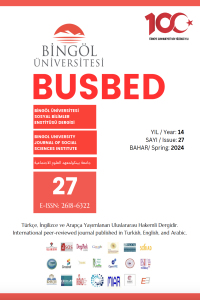COVID-19 PANDEMİ SÜRECİNDE ZORUNLU UZAKTAN EĞİTİM VE AKADEMİSYENLERİN UYUM SÜRECİ
COMPULSORY DISTANCE EDUCATION AND THE ADAPTATION PROCESS OF ACADEMICS DURING THE COVID-19 PANDEMIC
Author(s): Barış Çağirkan, İlayda ALBAŞSubject(s): School education, Higher Education , Sociology of Education, Distance learning / e-learning
Published by: Bingöl Üniversitesi Sosyal Bilimler Enstitüsü
Keywords: Distance education; Adaptation; Academics; COVID-19;
Summary/Abstract: During the COVID-19 Pandemic, approximately one and a half billion students globally switched from traditional face-to-face education to compulsory distance education without preparation. In the compulsory distance education process, academics’ understanding of education and learning is affected by various factors such as departments, faculties, colleges, and theoretical or practical courses. This article discusses the compulsory distance education model implemented during the COVID-19 Pandemic process and academics’ adaptation processes to this new teaching model. Phenomenology, one of the qualitative research designs, was used in this study. The research study group, which used a purposive sampling technique, consists of 20 participants working at the Faculty of Arts and Sciences and the School of Foreign Languages at a state university. Data were collected through semi-structured interviews and analysed using a descriptive analysis technique. In the findings, academics’ experiences and adaptation practices of the compulsory distance education process were presented in four categories: daily life practices, motivation and uncertainty, distance education, and use of information technologies. According to the research results, it was observed that academics’ working hours became uncertain with the compulsory distance education process, and they had trouble with time management. This situation has caused the distinction between work and private life to disappear, and academics feel they are working constantly. The uncertainties in course teaching affected the motivation of academics and slowed down the adaptation process to distance education. In addition, the low attendance of students in classes and the lack of switching on their cameras and microphones have decreased the quality of distance education. Academics tried various strategies to increase students’ active participation in courses. In the compulsory distance education process, students and academics increase their use of basic information technologies and learn new programs and applications over time. In this process, increasing academics’ use of information technology and diversifying course materials positively contribute to distance education. Recommendations include increasing the use of information technologies and the skills of students and academics, as well as learning and using these technologies in a regular program, which will improve the quality of distance education. In distance education, academics should use different teaching methods to make the course content more interactive and interesting. In addition, sharing strategies and experiences that will facilitate the adaptation of academics to the distance education process with their colleagues will guide other academics.
Journal: Bingöl Üniversitesi Sosyal Bilimler Enstitüsü Dergisi (BUSBED)
- Issue Year: 14/2024
- Issue No: 27
- Page Range: 1-18
- Page Count: 18
- Language: Turkish

